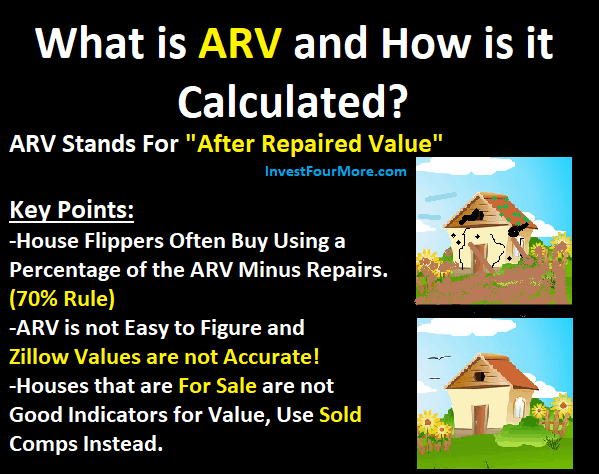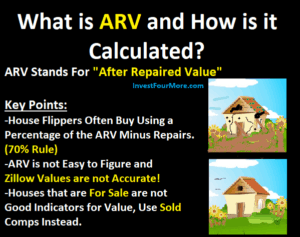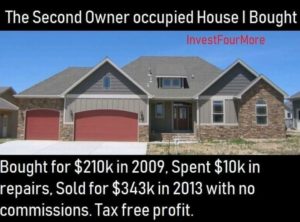
What is ARV and How Is it Calculated?
 The ARV (after repaired value) on a house is one of the most important things to know when flipping houses. It is also one of the most important things to know when buying rentals or wholesaling properties. ARV stands for “After Repaired Value” and is what the home will be worth once it is fixed up.
The ARV (after repaired value) on a house is one of the most important things to know when flipping houses. It is also one of the most important things to know when buying rentals or wholesaling properties. ARV stands for “After Repaired Value” and is what the home will be worth once it is fixed up.
Many real estate investors have a really hard time determining the values on properties and rely on real estate agents or others to figure that out for them. As a real estate investor, you need to be able to determine the ARV yourself without having to rely on others. It is fine to confirm your values, but relying solely on another person is one of the best ways to get yourself into trouble. It is not easy to determine the ARV, as learning the market you are investing in takes a lot of work. If you want to be a successful real estate agent, it will take time and work.
What does ARV mean?
The after repaired value is what a house will be worth after it is fixed up. The ARV assumes you will be selling the house on the MLS (multiple listing service) using a real estate agent. Selling the house on the MLS usually nets the most money to the seller.
Why is ARV important?
A lot of investors believe that buying foreclosures is a good deal, or that if they find a vacant house, they will make money because the seller is motivated. You can find deals on foreclosures or vacant houses, but the only way to know if they are deals is if you know what the ARV is. ARV is one of the most important factors when investing in anything.
House Flips
Knowing the ARV is vitally important when flipping houses. You make your money when you sell the property, and you must know what a property will sell for after you fix it up. What you pay for the property, how much you budget for repairs, and the type of financing you use can all depend on the ARV. If you are using hard-money lenders, they will only lend on a certain percentage of the ARV. It is hard to find properties with enough room to flip, and if you are off on the ARV, it can wipe out all of your profits.
I flipped 26 houses last year, and knowing the ARV is a key to my business. It is not an exact science, and we can be wrong at times, even after being in the business 15 plus years. One reason there is so much opportunity in real estate is that it is hard to value properties. That creates the opportunity to get deals.
The ultimate guide to flipping houses.
Rental Properties
The ARV may not seem important when buying rental properties, but it is. I want to get a good deal on any house I buy. Banks will also be more likely to lend to an investor if they are getting a great deal on a property. When you get a great deal on a rental, it helps in many ways:
- You walk into the deal with equity, increasing your net worth instantly.
- You make more money per month because your loan will have lower payments.
- You will have a lower debt-to-income ratio.
- With more equity, refinancing the property in the future will be easier. You may be able to get all the money you put into the property back using the BRRRR strategy.
- If you ever need to sell the property, you will be in a much better financial position.
It is easy to buy rentals at full retail value, but one of the greatest advantages in real estate is buying below market value. I do that on every house I buy.
Wholesaling
If you are wholesaling properties, you need to know the ARV as well. Wholesalers typically buy or get a house under contract that they will sell to another investor without making any repairs. To know how much another investor will pay for the property, you need to know the ARV. The ARV is one of the most important parts when wholesaling houses.
I have seen many wholesalers think they have deals when they are asking much more than a house flipper or landlord would pay. They don’t understand the ARV or how much an investor will pay based on that ARV. The 70% rule is one way to calculate how much house flippers will pay.
Personal house
Yes, the ARV is even important when buying a house to live in. You want to get a good deal on every house you buy. I have made a ton of money on my personal houses by getting great deals. The amazing thing about getting a great deal on your personal house is you can put less money down when buying a house to live in, and the profit is often tax-free!
How do you calculate the ARV?
The best way to learn what the ARV is is to immerse yourself in the market. There are many things you can do to begin your education:
- Decide on a specific market you want to learn. If you try to learn the entire city of Atlanta, it will take you years, and by the time you figure it out, the market will have changed. Focus on smaller areas.
- Look at Zillow, Redfin, Realtor.com, and the MLS for houses for sale in the area. Look at houses that need work and houses that have been repaired. You need to know what things are selling for in every condition.
- You need to view properties in person. You cannot sit at home and figure out values. You need a great real estate agent who will help you view houses.
- You need to look at the sold properties as well. Houses that are for sale can give you an idea of values, but they could also be overpriced and never sell. An agent can help you find sold comparable properties, and Zillow will list them as well.
- Eventually, you will begin to get an idea of what houses will sell for and what the ARVs are in certain areas.
Figuring out market values takes time; this will not happen overnight. You can start learning what values are right now, and it may be the most important thing you do as an investor.
This video goes into more detail on how to calculate the ARV:
How to dial in the ARV
You can get an idea of what houses will sell for, but you need to be an expert if you want to be the best real estate investor you can be.
Become a real estate agent
I am a real estate agent, which helps me a lot. I can pull up all comps from public records and all MLS information very easily. I also can view any house I want, whenever I want (pending the seller allowing showings) without having to bug my agent. Another thing I have done that helps me value houses is completing BPOs. BPOs are broker price opinions that are usually completed for banks to value properties. They are very similar to appraisals but not as detailed.
Non-real estate agents
Not everyone is a real estate agent or wants to be an agent. You can still figure out ways to come up with accurate ARVs without being an agent. If you can get access to the MLS, it will be extremely helpful. In some areas, you can be an unlicensed assistant with access to the MLS for other agents. You can also have an agent help you pull comps, or you can use Zillow. However, Zillow does not provide nearly as much information as the MLS.
Once you have the comps, you need to know how to compare sold properties to the property you are trying to value. Every property is different, which makes valuing them hard. This is one reason why you can get a great deal on houses.
What is the easiest way to determine market value?
The easiest way to determine market value is to hire a professional. I am a real estate agent and Realtor and provide comparative market evaluations for sellers all the time. I also provide values for investors and buyers as well. The trick for the new investor is convincing an agent that you are a serious investor and they aren’t wasting their time. The easiest way to overcome this problem is to buy a house, but that’s not realistic for a beginning investor trying to figure values.
My advice is to be perfectly honest with agents. Tell them you are new and are trying to determine market values. It helps if you have done some work first and can ask them if the value you came up with seems accurate. Then, buy them lunch or give them something in return. Simple gestures like buying lunch can make a huge difference in convincing someone to help you.
Don’t ask the agent for ridiculous things or make huge requests. Don’t ask for 100 values or sales comps from the last two years for an entire town. I recently had an investor ask me for all the cash-sold comps in the last year for metro Denver. Then, he wanted me to put them all in an Excel sheet and email them to him. I had never talked to this investor prior to this request and was just a little put off that he expected me to spend hours and hours of work for him. He gave me no reason to do this work and didn’t even tell me what he wanted this information for. To top it all off, I’m not even in the Denver market.
How do you know what a house is worth when you’re not a Realtor?
I mentioned that it would be good to have your own value in mind when talking to an agent. But, how do you come up with a value yourself? It is not easy to value a home unless you use a website like Zillow. Zillow, however, is not always accurate. I wrote an article about how accurate Zillow is here. Some of the values from Zillow were as much as 40 percent off on my own properties! I would not trust Zillow to provide a value on homes, although you can get some great information from Zillow.
When I value properties, I use sales comparables to determine the value of a home. I compare multiple sales in the last 6 months that are as similar as possible to the home I am valuing. I am a Realtor, so I can easily pull up any sold comps I want from MLS. If you are not an agent, it is not so easy to find sold comparables. You can find sold comps online at Zillow and a few other websites, but you don’t get all the information you need with those sold comps.
Zillow uses all sold comps it can find: foreclosures, short sales and sometimes trustee sales. The reason this is important is you don’t always know if those were market sales or distressed sales. A trustee sale price could simply be the amount the bank was owed and not a market sale. You also don’t know what the condition was of the sale, any concessions, or the financing terms. You don’t know how long a home was for sale, how many price changes there were, or if it was a short sale or REO (foreclosure). These are vital details you need to make an accurate value.
It is possible for an investor who is not an agent to determine a range of values based on online comps, but you still need to talk to an agent to make sure your values are accurate. If you have a great agent, they will probably offer you sold comps in an area and make your life much easier!
Should you use an appraiser to value your home?
Many people think they can just get an appraiser to figure out what their house is worth. However, this is not always the best idea. Appraisers value homes, but their primary objective is to make sure the home is worth at least as much as what the contract price is. The appraiser is typically hired by the bank, and they are used to confirm values, not determine values from scratch. I can say from experience when an appraiser has a contract price to work from, they usually come in very close to the contract price, whether that price is right on with value or 20 percent off. The reason this happens is appraisers face tremendous pressure not to value homes too high after the housing crisis. There was a lot of fraud during the housing crisis, and the entire appraisal system was changed.
When I refinance my rentals, the appraisals almost always come in low because the appraiser has no contract price to base the appraisal on. They are coming up with a value on their own, and they do not want to come in high. This also happens when a seller asks for an appraisal before they list a home. In my experience, a real estate agent will give much more accurate values than an appraiser…not because the appraisers do not know what they are doing, but because of the system they are forced to work in.
The video below goes into more detail on appraisals.
Using active comps to value properties
It is also possible to use active listings to value properties. It is not easy to use this method because an active listing does not mean it will sell for the asking price or at all. Active comps do give you an idea of what is for sale in a neighborhood and what the competition is. I use active comps to value properties along with sold comps. You can use active comps for a broad value but not a solid value. The best way to use active comps for values is to track them over time. Keep track of the asking price, when they go under contract, and how much they sell for. When you know the history of a sale on a website like Zillow, that comp becomes much more valuable.
If you see how fast an active comp sells, it can also help you decide if it was a good deal or not.
Adjusting for values on properties
When you find sold comps and active comps that are similar to your subject, your work is not done. You have to decide if you need to make adjustments for the differences between the comparables and the property you are valuing.
I won’t go into a lot of detail on this subject as I could write ten more articles on it and still not cover everything. If you have a home you are valuing with a one-car garage and the sales comps you are comparing it to has a two-car garage, you have to make an adjustment. If the bedroom, bathroom, or room count is different, if square footage is different, views, location or anything else is different, you need to make adjustments. Coming up with how much to adjust is the tricky part. More-expensive homes have different adjustments than less expensive homes. Different areas of the country put more value on certain amenities than other parts of the country.
Again, a real estate agent can help you figure out how much different amenities add in value. When you look at enough homes and comparables you should start to get an idea of how much to adjust. It will take time to get to know your market and be able to accurately determine values and adjustments.
For more information on real estate investing, check out my best-selling book Build a Rental Property Empire, which goes into how to find deals, how to determine what a good rental is, how to finance properties, how to manage them, how to repair them, how to find contractors, and much more. It is available on Amazon as a paperback or eBook and on audible as an audiobook.
Conclusion
Determining the ARV is extremely important for any real estate investor. You have to remember that every house is different, every area is different, and every house is in a different condition. I can’t tell you how many times people on YouTube or Facebook tell me my houses are overpriced. They live in a different state and assume housing prices are the same everywhere! If you are only relying on others to give you values, you could be making a huge mistake! A 10% difference in values could mean the difference between making and losing money.
Join me on The $100M Mission!
Get exclusive updates as I work to own $100M real estate by 2030 in today's market. Whether you're just starting out or already investing, you'll get actionable insights from my real-world deals and setbacks.
Plus, I'll help you set and achieve your own ambitious goals. Transform your financial future - subscribe now for weekly updates.
Together, we'll prove that massive success in real estate is still possible.

The value you give is awesome. I really enjoy reading your content and picking up the gems you drop alone the way.
Thanks!